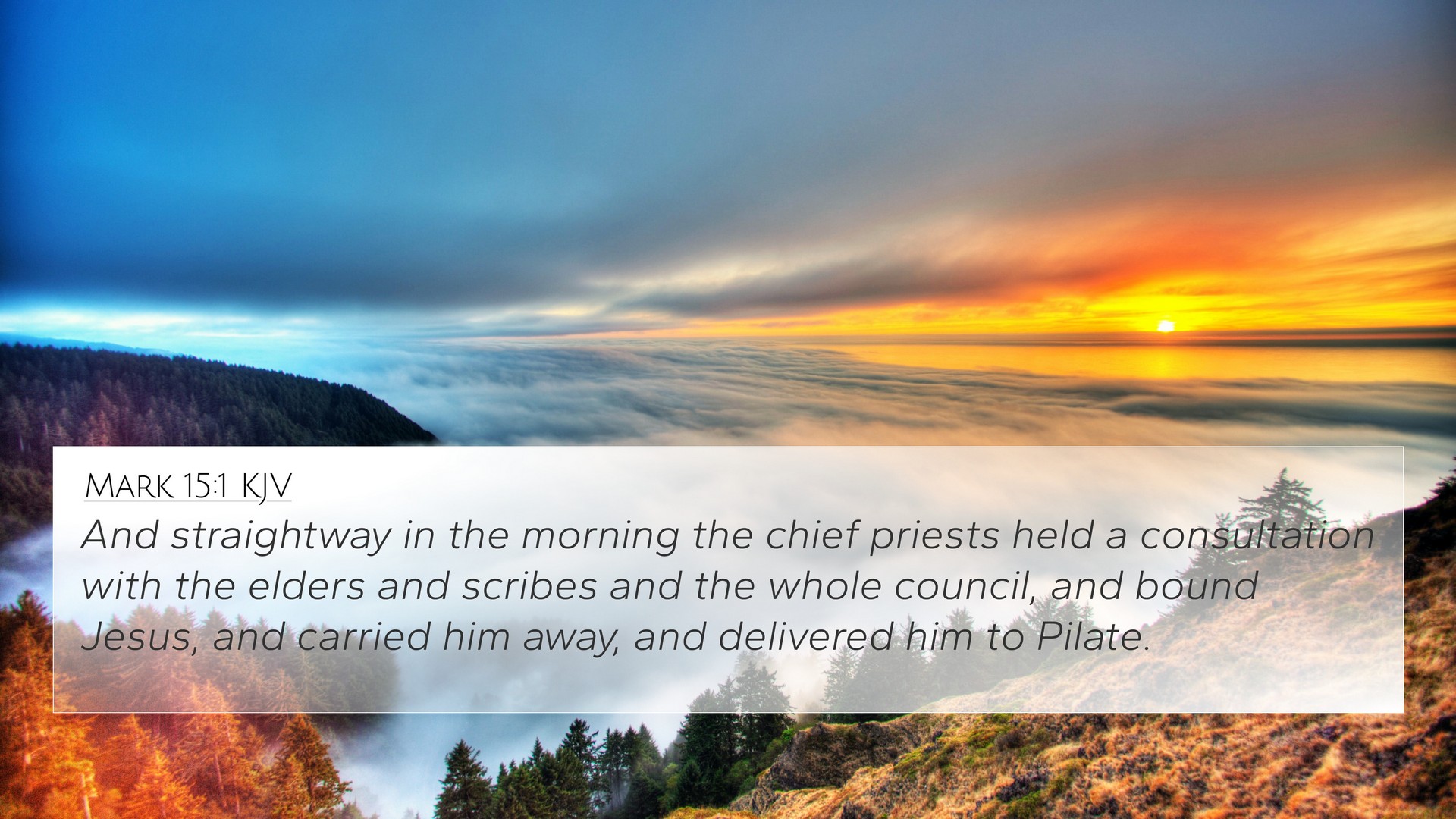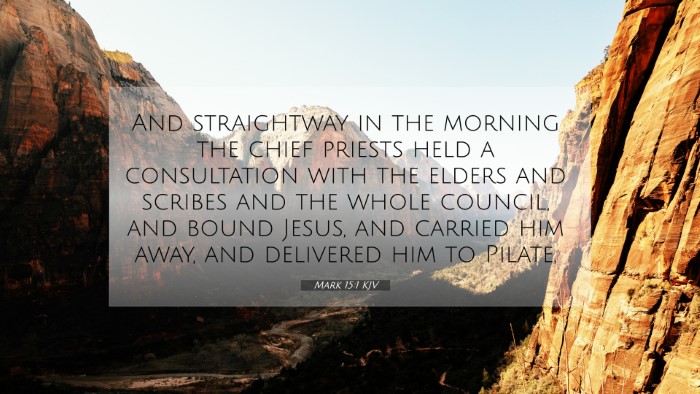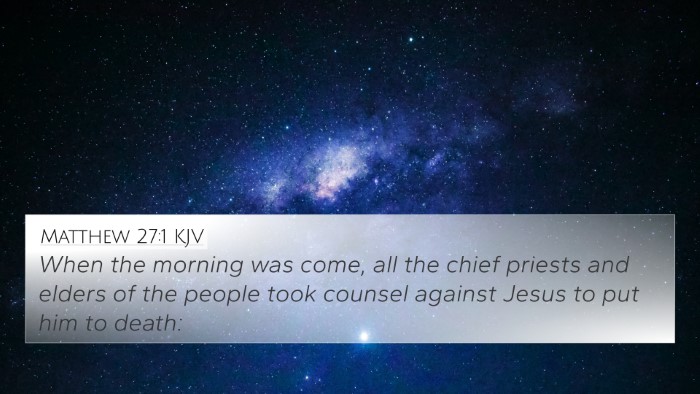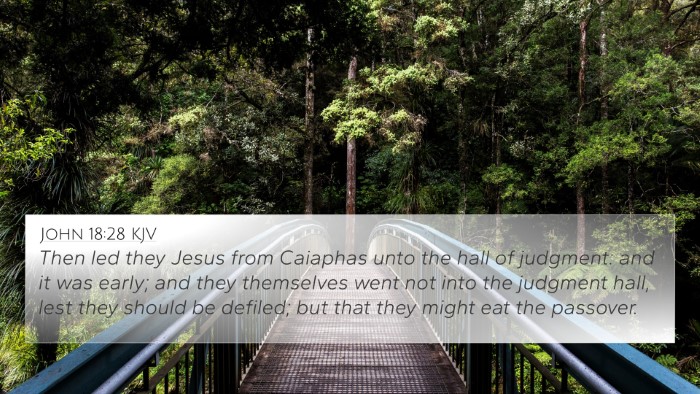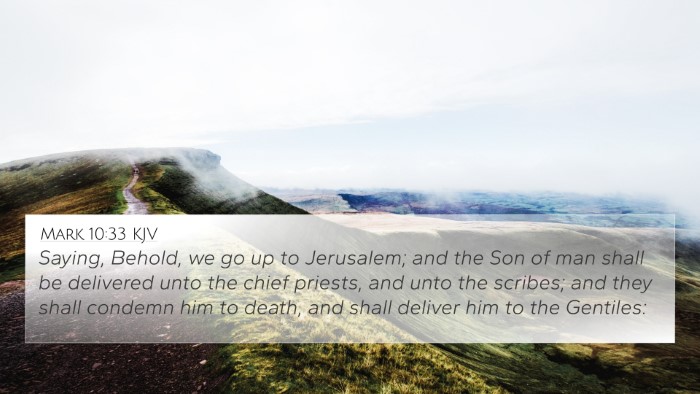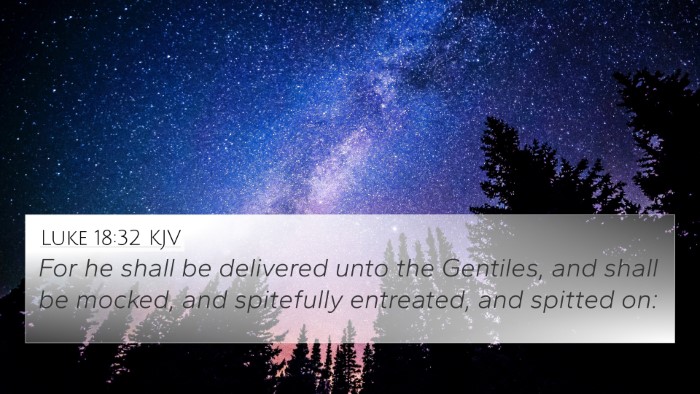Understanding Mark 15:1
Mark 15:1 states, "And straightway in the morning the chief priests held a consultation with the elders and scribes and the whole council, and bound Jesus, and carried him away, and delivered him to Pilate." This pivotal moment in the Gospel of Mark encapsulates the turning point in the narrative of Jesus' trial and crucifixion. Here, we explore the profound implications and meanings behind this verse through insights from public domain commentaries.
Contextual Significance
The setting of Mark 15:1 occurs after Jesus’ arrest in the Garden of Gethsemane. According to Matthew Henry, this verse marks the beginning of the final episode in the life of Christ where the religious leaders of Israel conspire against Him. The urgency displayed ("straightway in the morning") highlights the determined resolve of Jesus' adversaries to rid themselves of Him.
Albert Barnes highlights the role of the chief priests, elders, and scribes as the Sanhedrin, the highest Jewish council, which underscores the collusion of religious authority with political power in the actions against Jesus. This episode illustrates the culmination of spiritual injustice, as they plot to formally charge Jesus and hand Him over to Roman authority.
Adam Clarke further emphasizes that the phrase "held a consultation" indicates a premeditated scheme rather than an improvised act. The meticulous plotting reflects their refusal to accept Jesus' teachings and divine nature, leading them to seek the death penalty for Him.
Thematic Connections
Mark 15:1 serves as an important thematic connection in Scripture, showcasing the intersection of betrayal, justice, and fulfillment of prophecy. The events encapsulated here evoke various themes found throughout the Bible:
- Betrayal and Rejection: This verse encapsulates the ultimate betrayal of Jesus by the religious authority, reminiscent of Psalm 41:9 which foretells the betrayal by a close friend.
- Fulfillment of Prophecy: The actions leading to Jesus’ trial align with prophecies in Isaiah 53:7-8 concerning the suffering servant.
- Innocent Condemnation: The unjust treatment of Jesus mirrors the experiences of Job, portrayed as a righteous man suffering wrongful accusations.
- Divine Sovereignty: The verse invites contemplation upon God’s overarching plan as discussed in Acts 2:23, where it illustrates the predetermined plan and foreknowledge of God.
- The Collaboration of Powers: Reflects the collaboration between the Jewish leaders and Roman authorities as seen in John 18:28, where Jesus is presented to Pilate.
- Judgment of sin: The collective judgment against Jesus can be seen as a foreshadowing of the eventual judgment of sin and the ultimate victory of Christ in redemption.
Cross-Referencing Biblical Texts
This verse correlates closely to numerous references throughout the Bible, allowing for a richer understanding through cross-referencing. Here are some key cross-references related to Mark 15:1:
- Luke 22:66-71 - The council's questioning of Jesus at daybreak.
- John 18:28 - The narrative of leading Jesus to Pilate.
- Matthew 27:1-2 - Details of the council's decision to hand Jesus over to Pilate.
- Isaiah 53:4-5 - Prophecies regarding the suffering servant.
- Acts 3:13-15 - The acknowledgment of Jesus' innocence before Pilate.
- Psalm 2:1-2 - The conspiracy of earthly powers against God's anointed.
- John 19:16 - The fulfillment of their decision leading to Jesus’ crucifixion.
Conclusion
Mark 15:1 serves as a critical junction in the narrative of Jesus' suffering and the unfolding of divine prophetic destiny. The engagement of religious leaders in this verse portrays the human elements of rejection, collusion, and the desire for control over spiritual truth. The breadth of cross-references enhances our understanding of the interconnectedness of Scripture, revealing the seamless tapestry of God's redemptive plan through the trials of Christ.
For those interested in diving deeper into the connections between Bible verses, the tools for Bible cross-referencing can reveal profound insights, allowing for a robust study of the Word of God. Thematic analysis of such verses is crucial for understanding the overall message of the Bible, and Mark 15:1 is no exception, exemplifying themes that resonate through both the Old and New Testaments.
